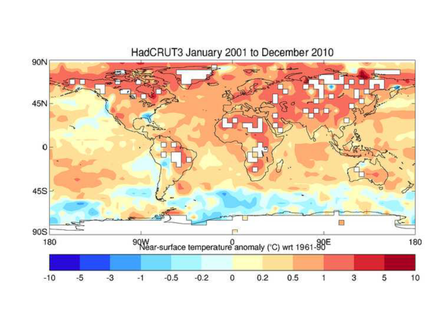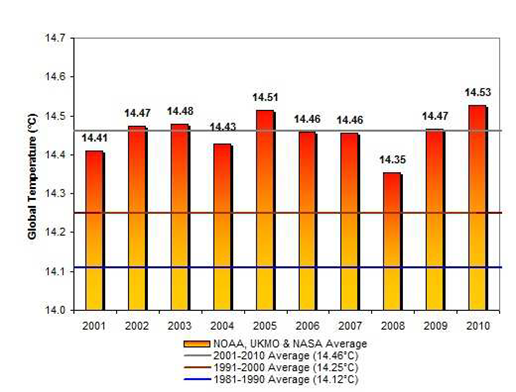The World Meteorological Organisation’s Annual Statement on the Status of the Global Climate
ECG Bulletin July 2012
The World Meteorological Organization’s Annual Statement on the Status of the Global Climate said that 2011 was the 11th warmest since records began in 1850. It confirmed preliminary findings that 2011 was the warmest year on record with a La Niña, which has a cooling influence. Globally-averaged temperatures in 2011 were estimated to be 0.40° Centigrade above the 1961-1990 annual average of 14°C.
Precipitation extremes, many of them associated with one of the strongest La Niña events of the last 60 years, had major impacts on the world. Significant flooding occurred on all continents, whilst major droughts affected parts of east Africa and North America. Arctic sea ice extent fell to near record-low levels. Global tropical cyclone activity was below average, but the United States had one of its most destructive tornado seasons on record.
The annual statement for 2011 was released for World Meteorological Day 23 March. In addition, WMO also announced preliminary findings of the soon to be released Decadal Global Climate Summary, showing that climate change accelerated in 2001-2010, which was the warmest decade ever recorded in all continents of the globe.
The rate of increase since 1971 has been “remarkable” according to the preliminary assessment. Atmospheric and oceanic phenomena such as La Niña events had a temporary cooling influence in some years but did not halt the overriding warming trend.
The “dramatic and continuing sea ice decline in the Arctic” was one of the most prominent features of the changing state of the climate during the decade, according to the preliminary findings. Global average precipitation was the second highest since 1901 and flooding was reported as the most frequent extreme event, it said.
The full report will be released later in the year following further analysis of data received from National Meteorological and Hydrological Services and collaborating monitoring agencies. The decadal summary aims to increase understanding of our varying and changing climate from a longer-term perspective and complements WMO’s annual reports.
“This 2011 annual assessment confirms the findings of the previous WMO annual statements that climate change is happening now and is not some distant future threat. The world is warming because of human activities and this is resulting in far-reaching and potentially irreversible impacts on our Earth, atmosphere and oceans,” said WMO Secretary-General Michel Jarraud
The annual statement for 2011 was released for World Meteorological Day 23 March. In addition, WMO also announced preliminary findings of the soon to be released Decadal Global Climate Summary, showing that climate change accelerated in 2001-2010, which was the warmest decade ever recorded in all continents of the globe.
The rate of increase since 1971 has been “remarkable” according to the preliminary assessment. Atmospheric and oceanic phenomena such as La Niña events had a temporary cooling influence in some years but did not halt the overriding warming trend.
The “dramatic and continuing sea ice decline in the Arctic” was one of the most prominent features of the changing state of the climate during the decade, according to the preliminary findings. Global average precipitation was the second highest since 1901 and flooding was reported as the most frequent extreme event, it said.
The full report will be released later in the year following further analysis of data received from National Meteorological and Hydrological Services and collaborating monitoring agencies. The decadal summary aims to increase understanding of our varying and changing climate from a longer-term perspective and complements WMO’s annual reports.
“This 2011 annual assessment confirms the findings of the previous WMO annual statements that climate change is happening now and is not some distant future threat. The world is warming because of human activities and this is resulting in far-reaching and potentially irreversible impacts on our Earth, atmosphere and oceans,” said WMO Secretary-General Michel Jarraud
The full press release, including seven figures and highlights on temperature, precipitation, extreme events and sea ice, is available at:
http://www.wmo.int/pages/mediacentre/press_releases/pr_943_en.htm
The WMO Statement on the Status of the Global Climate 2011 is available at:
http://www.wmo.int/pages/prog/wcp/wcdmp/documents/1085_en.pd
http://www.wmo.int/pages/mediacentre/press_releases/pr_943_en.htm
The WMO Statement on the Status of the Global Climate 2011 is available at:
http://www.wmo.int/pages/prog/wcp/wcdmp/documents/1085_en.pd



